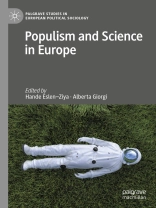This book provides the first systematic and comparative analysis of the intersections of populism and science in Europe, from the perspective of political sociology.
Populism is the object of rich scholarly debate over its definition and the best way to approach its study. But until now, little attention has been paid to the relationships between populism and science. Recently, the Covid-19 crisis has exposed the contradictions in this relationship, and this book combines an analysis of the theoretical aspects of the relationship between populism and science with rigorous empirical research.
The theoretical perspectives show populism as a thin-ideology, as discourse and performance, and as a political logic, consider both right-wing and left-wing populism, and focus on leaders as well as citizens. The book also offers an overview of controversies within different fields of ‘science’, including case studies on food science, climate change, vaccination, gender theory, COVID-19, and environmental issues.
The book will be of interest to scholars and students of a number of social science disciplines, including political sociology, political science and political psychology.
Cuprins
Introduction . Alberta Giorgi; Hande Eslen-Ziya.- Part 1. Theory .- Pseudo-science in Populism, Hande Eslen-Ziya.- The Role of Experts in Populist Politics: an Overview, Liv Sunnercrantz and T. Murat Yildirim.- The Whirl of Knowledge in Twitter: (anti-)populist hegemony challengers, Emilia Palonen.- Part 2. The European Level .- The EU’s answer to climate populism – Stringent and appropriate?, Thomas Sattich.- Populists’ Framings of the COVID-19 Pandemic and their Opponents in the EU Parliament, Carlo Berti and Carlo Ruzza.- Part 3. National Case Studies.- The anti-vax movement in Spain and in Italy. A reflection on the problematic relationship between science, politics and public opinion in late modernity, Clemente Penalva and Luca Raffini.- Qanon and conspiracy theories – the Italian case, Maria Francesca Murru.- Populist politics of counterknowledge: anti-gendercampaigns in Poland, Elżbieta Korolczuk.- Greenwashing Reactionary Movements. On Populist Instrumentalization of Environmental Issues, Gildas Renou.- Anti-gender politics as a democratic challenge in Norway’s populist moment , Elisabeth Lund Engebretsen.- Between Populism and Popular Citizenship in Science Conflict, Mette Marie Roslyng.- Inconvenient truths? Populist epistemology and the case of Portugal, Alberta Giorgi.- Linking Covid-19-related socio-economic anxieties with right-wing populism: A comparison between Europe and the United States, Gilles Ivaldi and Oscar Mazzoleni.
Despre autor
Hande Eslen–Ziya is Professor of Sociology at University of Stavanger, Norway and chair of the Populism, Anti-Gender and Democracy Research Group at the same institution.
Alberta Giorgi is Assistant professor of Sociology of culture and communication at the University of Bergamo, Italy, and chair of the Research Network Political Sociology of the European Sociological Association.












